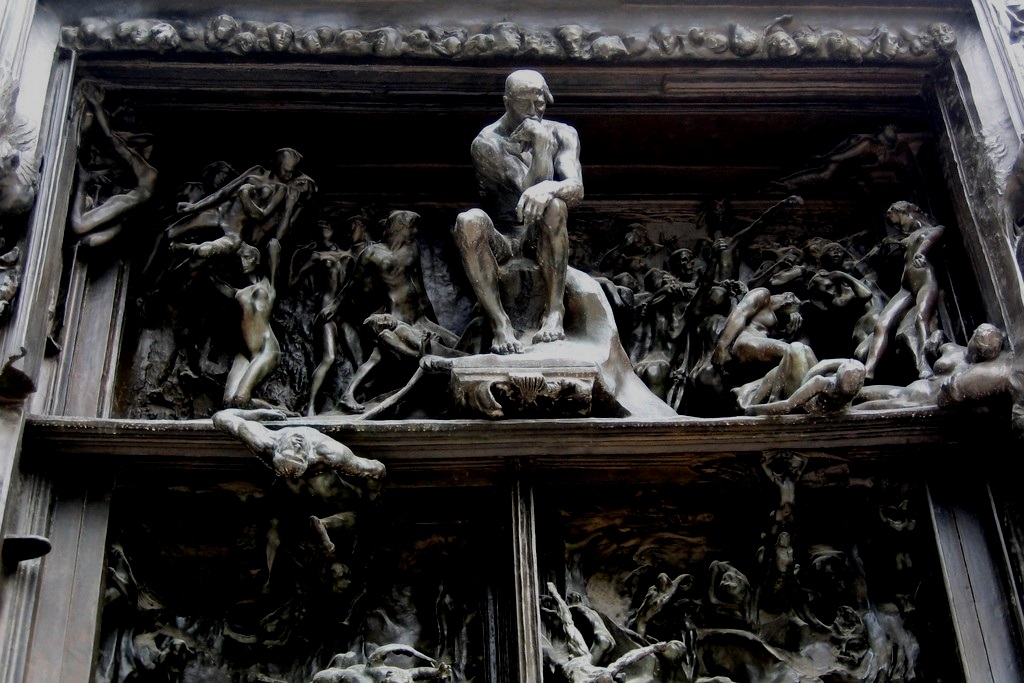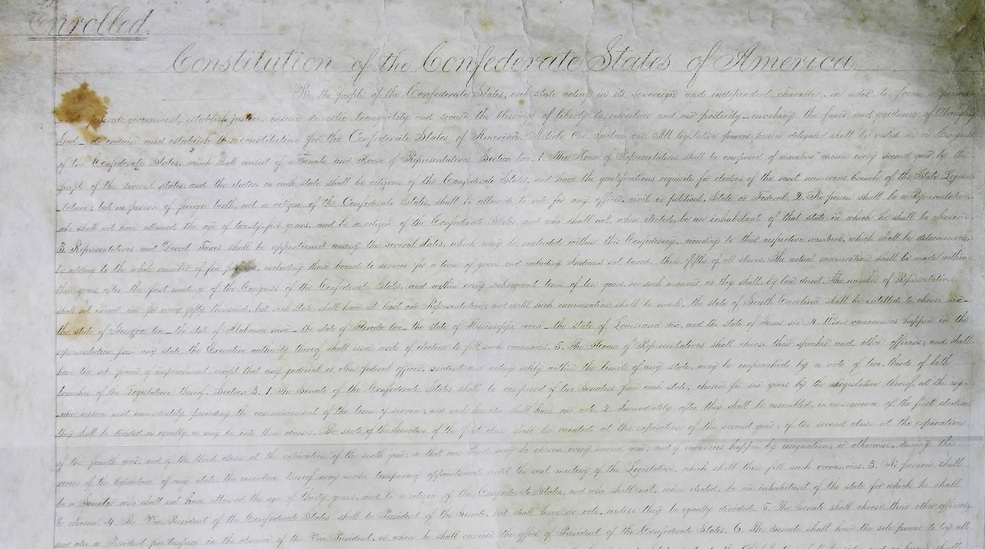Evil in Institutions
Photograph: The Constitution of the Confederate States of America, finalized on March 11, 1861 and now housed in the University of Georgia Library. Photo credit: Public domain.
Introduction
The resources below are examples of evil beyond simply laws — evil done by humans via patterns of relationship, information-dissemination, and formal and informal organizations we build. They serve as examples of the need to believe in good and evil as moral categories, a larger vision of human relationship and institutional power which can critique our own. They illustrate our need for a loving God to heal human nature in a loving way so we might transform our institutions.
Conversation Stations
These are the images used in artistic physical displays. They are survey questions and conversation starters that are topically and thematically organized. They demonstrate how Jesus is relevant to each topic or theme. You can also just view the images on your device. If you would like, see all our Conversation Stations; below are the ones that relate to the topic of Evil in Institutions.
Whose Justice? (and instructions and Christian Restorative Justice Study Guide)
Whose Justice? for Harvard Law School
What Can We Do About Evil? (and instructions and conversation tree) and smaller version and brochure version
Que Podemos Hacer Sobre La Maldad? for the Asociacion Dominicana de Estudiantes Evangelico, 2014
Does the Good Outweigh the Bad? (and instructions)
Race What's the Problem? (and instructions) and brochure version
Messages and Resources on Jesus Engaging Evil in Institutions
This video, the tenth in our video series on Tolkien found on our Arts and Theology page and our YouTube channel, looks at lessons about power and leadership from those three contexts. The Scouring of the Shire teaches us why we should resist "plantation capitalism." Rohan has lessons about migration, conflict, treaties, and peace. Gondor sifts its legacy from Numenor: an influential blessing at first, an imperial terror at the end. As usual, we look at Christian theology and ethics: the biblical theme of Empire, the question of women in power and leadership, and land, property, and hospitality.
00:10:36 The Shire
00:25:57 Rohan
00:38:14 Gondor
00:53:25 The Biblical Theme of Empire
01:07:08 Women Ruling and Leading
01:26:45 Land and Property
Video of a message given at Neighborhood Church of Dorchester, Aug 2, 2020. The New Testament understands structural, systemic injustice perfectly well, as shown by Luke 3:12 - 13. Tax collectors were given special instructions about how to resist being tools of imperial exploitation. This message explores the U.S. as founded as a legal gray zone for Christians to exploit people, and escape responsibility for Christian ethics. See also text in pdf format. This is part of our Church and Empire material.
Video of a message given at Neighborhood Church of Dorchester, Aug 9, 2020. This message explores the fact that the New Testament understands structural, systemic injustice perfectly well, as shown by Luke 3:14. The Roman soldiers performed a police terror function and extorted conquered peoples. We explore the police today in general as a way racial terror has been inflicted on American citizens. See also text in pdf format. This is part of our Church and Empire material.
Video of a message given at Neighborhood Church of Dorchester, Aug 16, 2020. Pentecost in Acts 2:1 - 11 is the expression of Jesus’ new humanity for all humanity. It is outward, self-giving, missional, and embracing of other languages and cultures. It is not monocultural, monolingual, self-protective, and fearful. Explains why Christian nationalism in the U.S. is such a problem, and wrong. See also text in pdf format. This is part of our Church and Empire material.
A message given to New Hope Fellowship Baltimore, MD, May 2015. This explores multiple biblical passages criticizing interest rate lending. Not only was such behavior exploitative of people in poverty, even if they “consented” to their own exploitation, it reflected a relational dynamic that cannot be grounded in the Trinitarian relations between Father, Son, and Holy Spirit. See also the slides.
-
BBC News, Market Crisis 'Will Happen Again'. BBC News, Sep 8, 2009. An interview of Alan Greenspan, who blames human nature for 2008-09 financial crisis, instead of also blaming specific financial practices. See more issues we track in Finance.
Ravi Somaiya, What Not to Say When Your Company Is Ruining the World. Time, Jun 1, 2010. British Petroleum CEO Tony Hayward misspeaks. See more issues we track in Environment & Health: Coal, Gas, Oil.
Maggie Zhang, 11 Psychological Tricks Restaurants Use to Make You Spend More Money. Business Insider, Jul 14, 2014.
Mary Nichols, Maker Of Common Blood Thinner Pradaxa Withheld Critical Safety Data. Design & Trend, Jul 26, 2014. See more issues we track in Economics: Corporate Law.
Shannon Whitehead, 5 Truths the Fast Fashion Industry Doesn't Want You to Know. Huffington Post, Aug 19, 2014.
Radley Balko, How Municipalities in St. Louis County, MO Profit from Poverty. Washington Post, Sep 3, 2014.
Paul Roberts, Instant Gratification: As the Economy Gets Ever Better at Satisfying Our Immediate, Self-Serving Needs, Who Is Minding the Future? American Scholar, Sep 8, 2014.
Talal al-Khatib, Tobacco Companies Still Battling Smoking-Cancer Link. Seeker, Jul 17, 2015.
Gabriel Sherman, How Roger Ailes Picked Trump, and Fox Viewers, Over Megyn Kelly. New York Magazine, Aug 11, 2015.
Bill McKibben, Exxon's Climate Lie: 'No Corporation Has Ever Done Anything This Big or Bad'. Guardian, Oct 14, 2015. See more issues we track in Environment & Health: Coal, Gas, Oil.
Paul Bloom, People Don't Actually Want Equality. The Atlantic, Oct 22, 2015.
Tristan Harris, How Technology Hijacks People’s Minds—from a Magician and Google’s Design Ethicist. Medium, May 18, 2016.
Tim Harford, The Problem with Facts. Financial Times, Mar 9, 2017. Big Tobacco promoted "agnosticism" about tobacco’s impact on health. Trump follows that strategy.
Sophia A. McClennen, The Right Wing War on Facts: The New Partisan Divide That's Destroying Our Nation. Salon, Jun 24, 2017.
Jerry Useem, Power Causes Brain Damage. The Atlantic, Jul/Aug 2017. How powerful people lose mental capacities because they insulate themselves from disagreement.
Julia Angwin, Jeff Larson, Madeleine Varner, and Lauren Kirchner, Despite Disavowals, Leading Tech Companies Help Extremist Sites Monetize Hate. ProPublica, Aug 19, 2017. Although most tech companies have policies against working with hate websites, PayPal, Stripe, Newsmax and others help keep more than half of the most-visited extremist sites in business.
David Gelles, Sundar Pichai of Google: ‘Technology Doesn’t Solve Humanity’s Problems’. New York Times Magazine, Nov 8, 2018.
Basav Sen, Dig Beneath the World’s Far-Right Governments—You’ll Find Fossil Fuels. Foreign Policy in Focus, Oct 9, 2019. “From Brazil to India to the United States, extractive industries have aligned themselves with authoritarian governments waging war on minority populations.” See more issues we track in Economics: Power Inequality and Environment & Health: Coal, Gas, Oil.
Nicholas J. Restrepo et.al., How Social Media Machinery Pulled Mainstream Parenting Communities Closer to Extremes and Their Misinformation During Covid-19. IEEE, Dec 2021. “Mainstream parenting communities on Facebook have been subject to a powerful, two-pronged misinformation machinery during the pandemic, that has pulled them closer to extreme communities and their misinformation. The first prong involves a strengthening of the bond between mainstream parenting communities and pre-Covid conspiracy theory communities that promote misinformation about climate change, fluoride, chemtrails and 5G. Alternative health communities have acted as the critical conduits. The second prong features an adjacent core of tightly bonded, yet largely under-the-radar, anti-vaccination communities that continually supplied Covid-19 and vaccine misinformation to the mainstream parenting communities. Our findings show why Facebook’s own efforts to post reliable information about vaccines and Covid-19 have not been efficient; why targeting the largest communities does not work; and how this machinery could generate new pieces of misinformation perpetually.” One group is featured by Katherine Fung, Moms for Liberty, Critical Race Theory Opponents, Wade Into COVID School Closures Fight. Newsweek, Jan 5, 2022. “Social and emotional learning is a vehicle that's being used to influence curriculum and to kind of weave critical race theory and other types of critical theory, including gender theory into our children's education and parents have had enough… "We want the masks off of the kids. Masking, quarantining, all of that should be at the sole discretion of the parent," she said.” See more issues we track in Right Wing Media and Left Wing Media.
Anderson Cooper, See Alex Jones’ Reaction When Mom Confronts Him With the Truth About Her Son. CNN, Aug 2, 2022. In court, Jones kept shaking his head, denying parents of children killed at Sandy Hook. Meanwhile, Jones is using bankruptcy laws and “a web of LLCs” to shield himself from liability. See more issues we track in Economics: Right Wing Media.
Mehdi Hasan, Blame Rupert Murdoch and Fox for Iraq, Trump, and The Big Lie. The Mehdi Hasan Show | MSNBC, Apr 20, 2023. Also, Brexit. See more issues we track in Economics: Right Wing Media.
Ari Melber, See Tucker Carlson Fired: Fox News Finally Forced to 'Pay For It'. The Beat | MSNBC, Apr 24, 2023. Contains a very telling video clip of Tucker Carlson imagining a liar telling lies all the time. See more issues we track in Economics: Right Wing Media.
Thomas Germain, ‘I Was Shadowbanned:’ How Hinge’s Algorithm Decides Who You Date. Gizmodo, Aug 21, 2023. “Some dating app users say manipulative algorithms suppress the good matches. When tech companies run romance, the truth is hard to grasp.” The app company is incentivized to keep people paying for premium service and on the app, not to find a marriage match so people leave the app. The problem of monopsony is also present. See also Enshittification (Wikipedia article).
-
NPR, Workers Dying in Qatar Ahead of 2022 World Cup. NPR, May 23, 2014.
Adrian Chen, The Laborers Who Keep Dick Pics and Beheadings Out of Your Facebook Feed. Wired, Oct 23, 2014.
Casey Newton, Bodies in Seats. The Verge, Jun 19, 2019. “At Facebook’s worst-performing content moderation site in North America, one contractor has died, and others say they fear for their lives” because of the toxic nature of the content.
For more examples, see our page on Labor: Wages and Health.
-
Neil Larson, Thomas Midgley, The Most Harmful Inventor in History. Open Mind BBVA, May 12, 2021. Midgley put lead into gasoline, then lied to the public about its safety. He also invented Freon-12, a chlorofluorocarbon. But corporations quickly implemented these chemical technologies. They were reversed only after incredible public mobilization.
Damon Beres, The iPhone Isn’t Cool. The Atlantic, Sep 8, 2022. This article illustrates how the human quest to out-market and out-compete can be so destructive. Referring to the iPhone 14 and big tech’s self-cannibalizing product development, Beres notes, “Having wrung so much value out of the Earth with so many new gizmos created every single year—did you know that humanity produces more than 59 million tons of electronic waste annually?—Big Tech is looking to the stars for its new ideas. Maybe there’s nowhere else to go.”
For more examples, see our section on Environment and Health.
-
Deborah Becker and Shannon Dooling, Documentary Series Looks at Sex Trafficking in Boston. NPR, Jan 30, 2015.
Katie Rose Guest Pryal, Raped on Campus? Don’t Trust Your College to Do the Right Thing. Chronicle of Higher Education, Mar 2, 2015.
Rich McHugh, “You Are to Stand Down”: Ronan Farrow’s Producer on How NBC Killed Its Weinstein Story. Vanity Fair, Oct 11, 2019. “Rich McHugh recounts how top NBC brass, including news chairman Andrew Lack and news president Noah Oppenheim, bowed to Harvey Weinstein to quash the truth” about Weinstein’s sexual abuse and harrassment of his female employees.
Maya Guzdar, What Happened the Day After I Was Sexually Harassed at the Pentagon. New York Times, Sep 5, 2021. Guzdar ives a frank, realistic assessment of organizational dynamics leading to the more typical lack of accountability.
The Infographics Show, Why No One Talks About What Happened to Germans After WWII. The Infographics Show, Aug 1, 2025. A 32 minute video. One very significant theme is the plight of German women and the challenges they faced, which is illustrative of how women face unusual vulnerabilities in war zones and post-conflict zones. The video has a bibliography of sources.
For a Christian critique of patriarchy from the biblical egalitarian perspective, see our video curriculum, It’s a Man’s World: The Genesis 3:16 Effect.
Toby Buckle, The Americans Who Saw All This Coming—but Were Ignored and Maligned. The New Republic, Dec 18, 2025. Interesting in this context for the ways that non-male people sensed authoritarianism in Trump, and how the Republican Party leaders welcomed it while gaslighting others as fear-mongering.
Call them the Cassandras: the people—mostly not white and male—who smelled the fascism all over Trump from jump street. Why were they “alarmists,” and how did “anti-alarmism” become cool?
-
Wikipedia, Assyrian Genocide (Wikipedia) by Ottoman Empire in 1915 against Assyrians, mostly Christians
Wikipedia, Pontic Genocide (Wikipedia) by Ottoman Empire in 1915 against Pontic Greeks, mostly Christians
Wikipedia, Armenian Genocide (Wikipedia) by Ottoman Empire in 1915 against Armenians, mostly Christians
Wikipedia, Unit 731 (Wikipedia) the biological and chemical research arm of the Imperial Japanese army which conducted human experiments
Wikipedia, Hermann Göring (Wikipedia) gives a good example of banal, bureaucratic evil from Nazi Germany:
On several occasions over the course of the trial, the prosecution showed films of the concentration camps and other atrocities. Everyone present, including Göring, found the contents of the films shocking; he said that the films must have been faked. Witnesses, including Paul Koerner and Erhard Milch, tried to portray Göring as a peaceful moderate. Milch stated it had been impossible to oppose Hitler or disobey his orders; to do so would likely have meant death for oneself and one's family. When testifying on his own behalf, Göring emphasised his loyalty to Hitler, and claimed to know nothing about what had happened in the concentration camps, which were under Himmler's control. He gave evasive, convoluted answers to direct questions and had plausible excuses for all his actions during the war. He used the witness stand as a venue to expound at great length on his own role in the Reich, attempting to present himself as a peacemaker and diplomat before the outbreak of the war. During cross-examination, chief prosecutor Robert H. Jackson read out the minutes of a meeting that had been held shortly after Kristallnacht, a major pogrom in November 1938. At the meeting, Göring had plotted to confiscate Jewish property in the wake of the pogrom. Later, David Maxwell-Fyfe proved it was impossible for Göring not to have known about the Stalag Luft III murders—the shooting of fifty airmen who had been recaptured after escaping from Stalag Luft III—in time to have prevented the killings. He also presented clear evidence that Göring knew about the extermination of the Hungarian Jews.
Göring was found guilty on all four counts and was sentenced to death by hanging. The judgment stated: “There is nothing to be said in mitigation. For Göring was often, indeed almost always, the moving force, second only to his leader. He was the leading war aggressor, both as political and as military leader; he was the director of the slave labour programme and the creator of the oppressive programme against the Jews and other races, at home and abroad. All of these crimes he has frankly admitted. On some specific cases there may be conflict of testimony, but in terms of the broad outline, his own admissions are more than sufficiently wide to be conclusive of his guilt. His guilt is unique in its enormity. The record discloses no excuses for this man.”[138]
Facing History and Ourselves (website)
Our World in Data (website)
DTJ (founded 2004) documenting crimes against children worldwide
The Synesis Journal: A Journal of Science, Technology, Ethics, and Policy
John Gray, Heresies: Against Progress and Other Illusions
Nicholson Baker, Why I'm a Pacifist: The Dangerous Myth of the Good War Before we blame God for the Holocaust, we need to read this article.
Jerry Elmer, Ordinary Evil: Vietnam's History Reveals the Banality of Systemic Violence
Philip Gourevitch, After the Genocide When a people murders up to a million fellow-countrymen, what does it mean to survive? New Yorker Magazine, Dec 18, 1995.
Paul Brown, Scientist "Killed Amazon Indians to Test Race Theory". Guardian, Sep 23, 2000. And Emily Eaken, How Napolean Chagnon Became Our Most Controversial Anthropologist. New York Times Magazine, Feb 13, 2013.
Tony Judt, Postwar: A History of Europe Since 1945. Penguin Books | Amazon page, Sep 2006. A comment: “Even after Germany's defeat, the continent continued to be bloodied with violent retribution, purges and killings in places like Greece and Yugoslavia. Not only does the war not end by 45, but neither does the active persecution of Jews, including many murdered by Polish pogroms. Moreover, Judt believes that many of the other offenders such as Austria get away lightly, leaving Germany to bear the brunt of the blame for WW2. Judt brings attention to the phenomenon of "Waldheimer's disease" -- the inability to recollect one's actions during WW2, named after Kurt Waldheim, who went on to serve as the PM of Austria. Often overlooked, especially in Continental Europe, is the significance of the Marshall Plan - a $200 billion "investment" on Western Europe to help restore its infrastructure, housing, etc. Judt goes on to write that all this helped Europe create economic and public policy models that have now become the envy of the world, such as a robust social safety net, affordable healthcare, etc. On the flip side, the aging population, low birth rates, rampant immigration, the unsustainable welfare models, etc. are noted as serious challenges. Judt has no sacred cows and spares no one. For instance, he disabuses the reader of the notion that America single handedly defeated communism. In fact, the best parts of the book are Judt's country-by-country blow-by-blow account of how communism was actually defeated. No punches are held back as he describes postwar Britain as a dirty, cold and bankrupt land, including a complete takedown of PM Anthony Eden and co. for the Suez affair.” See also Ta-Nehisi Coates, The Man Who Freed Me From Cant. The Atlantic, Nov 13, 2021. Coates says that he felt released from the need to be optimistic, and preach hope.
Jonathan V. Last, The Case for the Empire. Weekly Standard, May 16, 2002.
Eleanor Stein, Construction of an Enemy. Monthly Review, Jul 1, 2003. About the Nazi technique of pitting race vs. race, religion vs. religion, using nativism and foreign policy
Jane Mayer, The Predator War: What Are the Risks of the C.I.A.’s Covert Drone Program? New Yorker Magazine, Oct 26, 2009.
Campbell Robertson, Police Are Charged in Post-Katrina Shootings. New York Times, Jul 13, 2010.
Andrew Tavani, Inside The Mind of Madoff: NYT's Diana Henriques Discusses New Book 'Wizard Of Lies'. Huffington Post, Apr 26, 2011.
Jake Halpern, Iceland's Big Thaw. New York Times, May 13, 2011.
Edward S. Herman and David Peterson, Steven Pinker on the Alleged Decline of Violence. International Socialist Review. And full book (2012)
Lia Mandelbaum, Hitler's Inspiration and Guide: The Native American Holocaust. Jewish Journal, Jun 18, 2013.
Roger Berkowitz, Misreading 'Eichmann in Jerusalem'. New York Times, Jul 7, 2013.
Kali Ma, Humanity in Flux: Would a Species that Recognizes its Own Worth Be Actively Destroying Itself? The Hampton Institute, Dec 12, 2013.
Michael B Kelley, This World Map Shows Where Press Freedom Is Strongest And Weakest. Business Insider, Feb 12, 2014.
Who Pays Film, Who Pays the Price? The Human Cost of Electronics. youtube video, Mar 4, 2014.
John Gray, Captain America's Moral Philosophy. The New Republic, Apr 2, 2014.
David Daley, "America as the No. 1 Warmonger: President Jimmy Carter Talks to Salon About Race, Cable News, "Slut-Shaming" and More. Salon, Apr 10, 2014.
Olga Khazan, Why Do So Many Women Wear So Much Makeup? The Atlantic, Apr 28, 2014. Even though men don't find make-up and thinness as attractive as they think; why men think women are attracted by muscle even though they aren't; the industries' deception
Graeme Wood, Hell is an Understatement: A Report from the Bloody, Crumbling Central African Republic. The New Republic, Apr 30, 2014.
Daniel R. Schwarz, Do the Humanities Help Us Understand the World in Which We Live? Huffington Post, May 2, 2014.
WBEZ, The Secret Recordings of Carmen Segarra. This American Life, Sep 26, 2014.
Which Dictator Killed the Most People? The Mind Unleashed, Oct 4, 2014.
Sophie Kleeman, One Powerful Illustration Shows Exactly What's Wrong With How the West Talks About Ebola. Mic, Oct 7, 2014.
C.J. Chivers, The Secret Casualties of Iraq's Abandoned Chemical Weapons. New York Times, Oct 14, 2014.
Eric Lichtblau, In Cold War, U.S. Spy Agencies Used 1,000 Nazis. New York Times, Oct 26, 2014.
Eric Lichtblau, The Nazis Next Door: How America Became a Safe Haven for Hitler's Men. Amazon book, Oct 28, 2014. And review by Fresh Air, How Thousands Of Nazis Were 'Rewarded' With Life In The U.S. NPR, Nov 5, 2014. See also Kevin C. Ruffner, CIA's Support to the Nazi War Criminal Investigations. CIA, Apr 14, 2007.
Michael Allen, Massacre in the Family: My Great-Great-Grandfather and an American Indian Tragedy. Wall Street Journal, Nov 24, 2014.
Jane Mayer, Torture and the Truth: How Unthinkable Cruelty Became Official Policy, But Will It Spur Lasting Reform? New Yorker Magazine, Dec 22, 2014.
Charles Davis, America, Nation of Torturers: Stop Saying “This Isn’t Who We Are” — Here’s the Real Truth. Slate, Dec 16, 2014.
Jack Cloherty and Pierre Thomas, Teens as Young as 13 Rescued From Super Bowl Sex Trafficking. ABC News, Jan 4, 2015.
Annie Jacobsen, Operation Paperclip: The Secret Intelligence Program that Brought Nazi Scientists to America. Amazon book, Jan 20, 2015. And review by Jay Watkins, Intelligence in Public Literature. CIA, Oct 6, 2014. Review posted before the book was officially released?
Gary Haugen, The Hidden Reason for Poverty - Violence. TED talk, Mar 2015.
Chris Bohjalian, Why Does Turkey Continue to Deny Armenian Genocide? Boston Globe, Mar 9, 2015.
John Gray, Steven Pinker is Wrong About Violence and War. The Guardian, Mar 13, 2015.
Kevin Kruse, A Christian Nation? Since When? New York Times, Mar 14, 2015. On how U.S. corporations linked libertarian capitalism (anti-New-Deal) and Christianity from the 1930's.
Oliver Laughland, Guatemalans Deliberately Infected With STD's Sue Johns Hopkins University for $1bn. The Guardian, Apr 2, 2015.
Yuka Hayashi, Japan's Textbook Changes Get Failing Grade From Neighbors. Wall Street Journal, Apr 7, 2015.
Frank Bruni, Best, Brightest - and Saddest? New York Times, Apr 11, 2015.
WGBH, My Lai. PBS/WGBH video.
Brittany Wong, The 10 Most Dangerous Phrases in a Relationship. Huffington Post, May 13, 2015. And see "The Moment I Knew" below
Rod Dreher, Heart of Darkness: War and the Things We Don't Talk About. The American Conservative, May, 19, 2015.
Lance Armstrong, If You Didn't Gear Up, Hard to Stick Around. Dan Patrick Show, Jun 2, 2015.
Maria Konnikova, The Real Lesson of the Stanford Prison Experiment. New Yorker, Jun 12, 2015.
James W. Lowren, Why Do People Believe the Myths About the Confederacy? Because Our Monuments and Textbooks Are Wrong. Washington Post, Jul 1, 2015. An example of when history was written by the losing South
Adam B. Ellick and Nicholas Kristof, The Worst Atrocity You've Never Heard Of. New York Times, Jul 13, 2015. About the Nuba Mountains in Sudan
Lucius McMannis, Hacktivist Group Anonymous Promises To De-Hood 1,000 KKK Members. Addicting Info, Oct 27, 2015.
Liz Kowalczyk and Patricia Wen, Why Didn't Anyone Stop Doctor Hardy? Boston Globe, Dec 6, 2015.
Hailey Wallace, The Man Who Killed Tamir Rice. Black Enterprise, Dec 30, 2015. Citing emotional instability and systemic failure
Georgina Kenyon, The Man Who Studies the Spread of Ignorance. BBC, Jan 6, 2016. On corporate efforts at spreading disinformation
Sukjong Hong, The "Comfort Women Deal" Between South Korea and Japan: Six Alternative Views. Korea Expose, Feb 2, 2016.
Glynn Custred, Turning Anthropology from Science into Political Activism. John William Pope Center, Feb 17, 2016.
Sarah Kaplan, The Darker Link Between Ancient Human Sacrifice and Our Modern World. Washington Post, Apr 5, 2016.
David Swanson, Top 12 Reasons the Good War Was Bad: Hiroshima in Context. Washingtons blog, May 24, 2016.
Daniel Marans, Trump Supports Cutting Social Security From A ‘Moral Standpoint:’ Report. Huffington Post, May 28, 2016. Lack of transparency
Liyan Qi, U.S. Schools Expelled 8,000 Chinese Students. Wall Street Journal, May 29, 2016.
Steven Paulikas, How Should We Respond to ‘Evil’? New York Times, Jun 27, 2016.
John Oliver, Doping. Last Week Tonight, Jun 26, 2016.
Caroline Randall Williams, You Want a Confederate Monument? My Body Is a Confederate Monument. New York Times, Jun 26, 2020. “The black people I come from were owned and raped by the white people I come from. Who dares to tell me to celebrate them?”
Lynsey Chutel, Germany Finally Apologizes for Its Other Genocide - More Than a Century Later. Quartz, Jul 16, 2016. And BBC Namibia, Namibia Genocide and the Second Reich. BBC video, 2004. 1 hr documentary
William Astore, Why It's So Hard for Members of the Military to Speak Out. Tom Dispatch, Aug 11, 2016.
NY Times Editorial Board, When Police Unions Impede Justice. New York Times, Sep 3, 2016.
Om Malik, Silicon Valley Has an Empathy Vacuum. The New Yorker, Nov 28, 2016.
Jonathan Chait, David Brooks and the Intellectual Collapse of the Center. New York Magazine, Nov 29, 2016.
David A. Graham, The 'Comet Pizza' Gunman Provides a Glimpse of a Frightening Future. The Atlantic, Dec 5, 2016.
Newsner, Woman Hides Thousands of Children in Coffins - Then She's Arrested and Her Dark Secret Emerges. Newsner, Dec 17, 2016.
Josh O'Connor, The Asian Holocaust Killed Twice As Many People As The Nazis Did. Dose, Jan 16, 2017.
Pierre Keys, Alternative Facts in Bonhoeffer's Germany. Christian Century, Feb 15, 2017.
Andrew Higgins, Trump Embraces ‘Enemy of the People,’ a Phrase With a Fraught History. New York Times, Feb 26, 2017.
Richard Lloyd Parry, The School Beneath the Wave: The Unimaginable Tragedy of Japan's Tsunami. The Guardian, Aug 24, 2017. A failure of bureaucratic leadership; attempt to evade responsibility
Kevin M. Levin, The Pernicious Myth of the ‘Loyal Slave’ Lives on in Confederate Memorials. Smithsonian, Aug 17, 2017.
The Florida Bookshelf, 5 Books on the True History Behind Confederate Monuments. University of Florida Press, Oct 2017. Very helpful books on unmasking white nationalist propaganda about the South, the Civil War, and American history
Adam Serwer, The Nationalist's Delusion. The Atlantic, Nov 20, 2017. A helpful, historically broad analysis of how racism manifests in politics
Yoram Hazony, The Dark Side of the Enlightenment. Wall Street Journal, Apr 6, 2018. Today’s advocates oversell the benefits of unfettered reason. They dismiss the contributions of tradition, religion and nationalism to human progress.
Kristin Romey, Exclusive: Ancient Mass Child Sacrifice May Be World's Largest. National Geographic, Apr 26, 2018. Incan child sacrifice dating back ~550 years ago
Lynn Parramore, Meet the Economist Behind the One Percent’s Stealth Takeover of America. Institute for New Economic Thinking, May 30, 2018. "Nobel laureate James Buchanan is the intellectual linchpin of the Koch-funded attack on democratic institutions, argues Duke historian Nancy MacLean"
Knowing Better, Playing the Victim | Historical Revisionism and Japan. Knowing Better, Jul 8, 2018. A 24 minute video. On the U.S. covering up Japan’s war crimes, the nature of historical memory, and Japan’s refusal to officially recognize its war crimes during World War II.
Sarah Condon, As Advent Approaches: Evil is Well-Organized. Mockingbird, Nov 27, 2018. Condon ompares the death of journalist Jamal Kashoggi to the death of the concubine in Judges 19; this type of evil requires organization
Ben Lefebvre and Nick Juliano, How Zinke Lost His Way. Politico, Dec 21, 2018. A somewhat sympathetic take examining lack of conflict-of-interest laws in his native Montana
Eric Levitz, How American Exceptionalism Is a Dangerous Myth. New York Magazine, Jan 2, 2019. Involving American foreign policy
Hannah Beech and Adam Dean, Nothing Bad Happened Here. Believe Us, They Said. How Myanmar Covered Up Ethnic Cleansing. New York Times, Oct 15, 2019.
David Pakman, Former Cult Member on How to Deprogram Trumpists. The David Pakman Show, Oct 28, 2019. Interview with Steve Hassan, The Cult of Trump: A Leading Cult Expert Explains How the President Uses Mind Control. Amazon book, Oct 2019. Cites the evangelical right-wing DC group “The Family,” the Catholic right-wing group Opus Dei (of which William Barr is a member), The New Apostolic Reformation where leaders call themselves “apostles.” Perspectives like this are important to understanding how authoritarianism is appealing to people, especially those who are religious.
Timothy Egan, Trump’s Evil Is Contagious. New York Times, Jan 17, 2020. “The president has shown us exactly what happens when good people do nothing.”
Mark Lawrence Schrad, Why Americans Supported Prohibition 100 Years Ago. New York Times, Jan 17, 2020. “Temperance crusaders weren’t crackpots. They were fighting the business of making money off addiction.”
The Hill, Dem. Senator Exposes Dark Money Scheme That Propped Up Kavanaugh and Barrett. The Hill, Aug 7, 2021. Re: Sen. Sheldon Whitehouse (D-RI) gives a detailed review of the actions of the Judicial Crisis Network (501c4), and its corporate twin, the Judicial Education Project (501c3).
Tara Brown, Elizabeth Holmes Exposed: The $9 Billion Medical ‘Miracle’ That Never Existed. 60 Minutes Australia, Aug 8, 2021. Holmes fundraised money and board support “from older white men” like Gen. James Mattis, Henry Kissinger, George Schultz, etc. Notable that women seemed to question Elizabeth Holmes before men did. For example, see Erika Cheung, Theranos, Whistleblowing and Speaking Truth to Power. TED Talk, Nov 26, 2020. Cheung recounts an in-person meeting with George Schultz, who ignored her scientific concerns.
Sprouts, Bonhoeffer‘s Theory of Stupidity. Sprouts, Oct 15, 2021. Features nationalist and ethno-fascist jingoism.
Ancient Tone, Truly Evil Human Experiments That Actually Happened. Ancient Tone, Oct 16, 2024.
Bruno Maçães, Gaza and the End of Western Fantasy. Time, Jan 10, 2024.
Ancient Tone, The Worst Massacre of Native Americans. Ancient Tone, Dec 8, 2024. The Bear River Massacre of January 1863 in Preston, Idaho.
Ancient Tone, The Brutal Things Committed by Every European Colonial Power. Ancient Tone, Dec 10, 2024.
Irene I. Vega, Bordering on Indifference: Immigration Agents Negotiating Race and Morality. Princeton University Press | Amazon page, 2025. People choose bureaucratic obedience over personal morality — the case of Mexican-American ICE agents apprehending Mexican subjects.
“I show that indifference is a major part of that moral economy. Michael Herzfeld defines indifference as “the rejection of common humanity . . . [and] the denial of identity, of selfhood” and argues that Western bureaucracies thrive on indifference, even as national myths celebrate hospitality. Nowhere is the paradox between espoused inclusion and indifference more visible than in the United States, a country that presents itself as a nation of immigrants and celebrates e pluribus unum, despite its settler-colonialist history and record of racialized exclusion.
I examine the production of indifference on the front line of US immigration control, both as a bureaucratic strategy that agents use to look away from the most conflicting aspects of their work, and as a major product of their efforts to cultivate a moral sense of self. In doing so, I reveal how agents normalize socially and legally constructed categories, even when they are faced with evidence that contradicts the validity of these categories. My analysis thus extends our knowledge of how the moral judgments, emotional reactions, and simplified heuristics of immigration agents working within and outside the United States function as mechanisms of compliance and stability in what Cecilia Menjívar aptly called “bureaucracies of displacement.”
Thinking about indifference helps us unlock the bureaucratic dimension of immigration control. Not only are detention, deportation, and border control “spectacles” that enact illegality and trade in cruelty, but they are also less visible forms of “slow violence” that are carried out routinely under the guise of legal rationality. Bordering on Indifference thus traces the development of what Hannah Arendt famously called the “banality of evil”—it shows how immigration bureaucracies produce apathy and distance, perpetuating exclusion through culture, law, and process, no matter what their workforce looks like. At no point do the agents featured in this book appear as unthinking cogs in a machine, however. We see that agents like Marcos Payan and his colleagues are invested in being indifferent to the moral ambiguities and racialized character of immigration control because protecting the status quo pays—they get to keep their job—and because if undocumented migration is not seen as categorically bad, they run the risk of not being seen as good.”
The Infographics Show, Why No One Talks About What Happened to Germans After WWII. The Infographics Show, Aug 1, 2025. A 32 minute video. One very significant theme is the plight of German women and the challenges they faced. The video has a bibliography of sources.
Evil: Topics
Christian teaching explains the Evil Within as the source of the Evil Between, Evil Laws, and Evil Institutions. Evil and God’s Goodness spotlights God’s call for our partnership in undoing evil, via the theme of divine fire in Scripture. So if you are on a spiritual search, consider browsing through our materials in that sequence.






